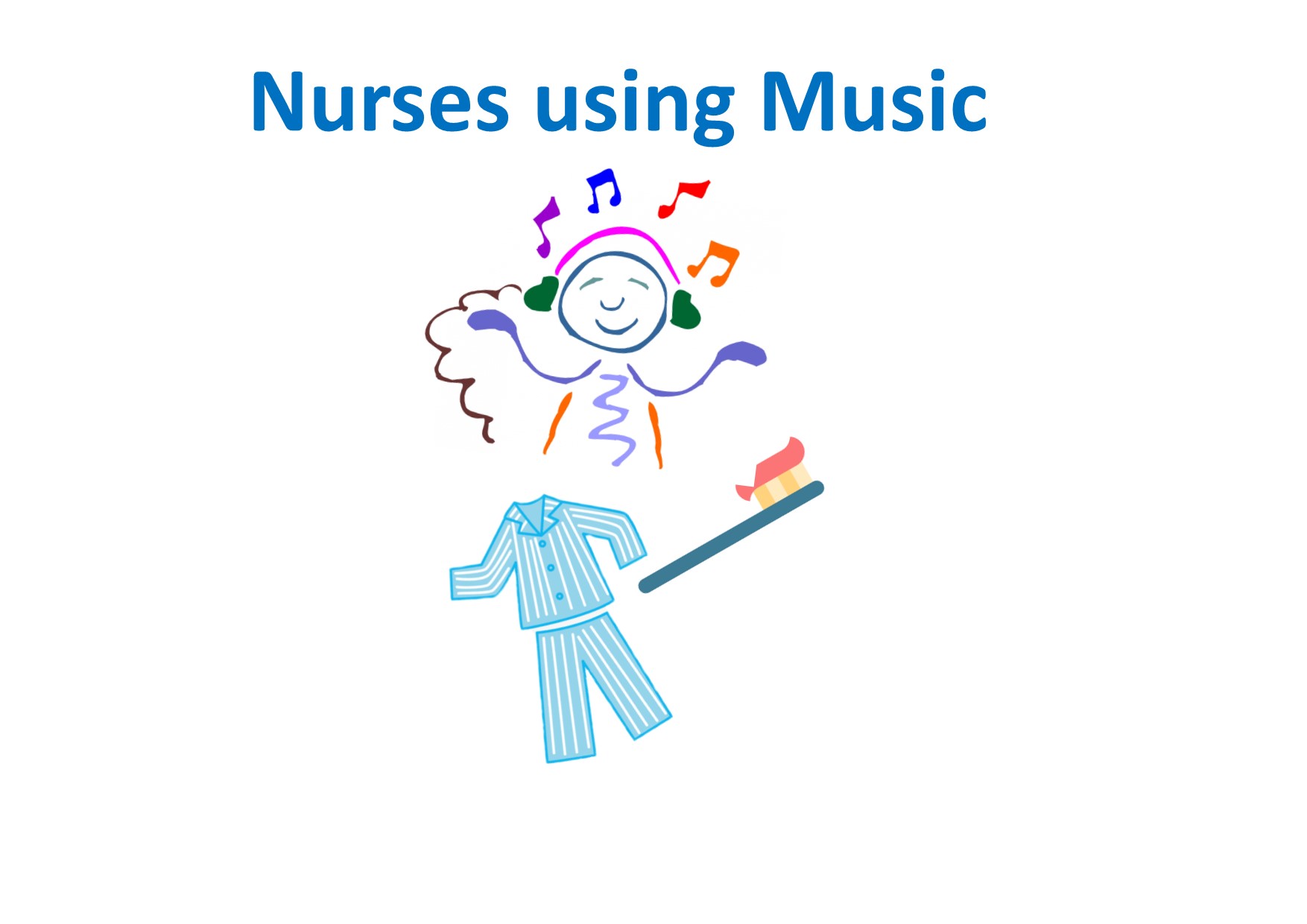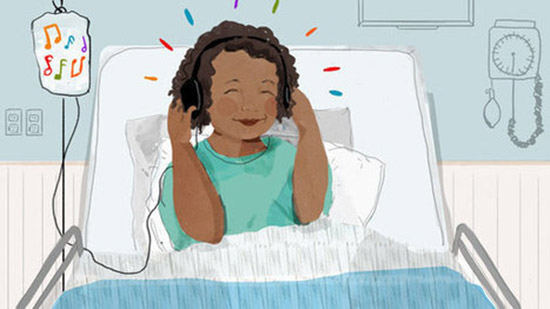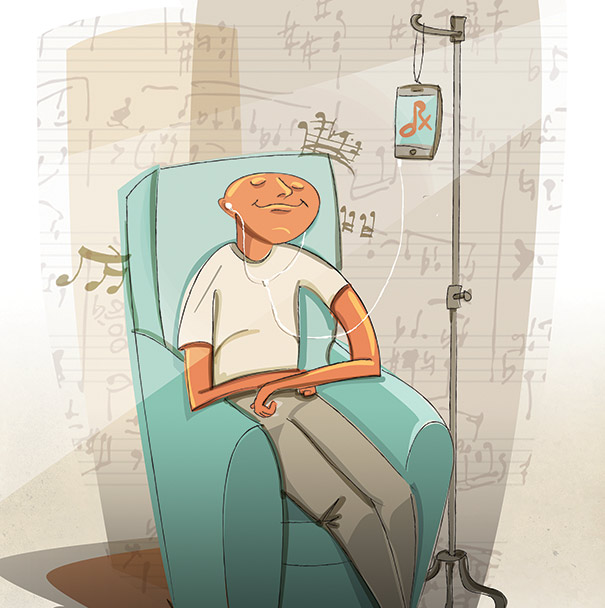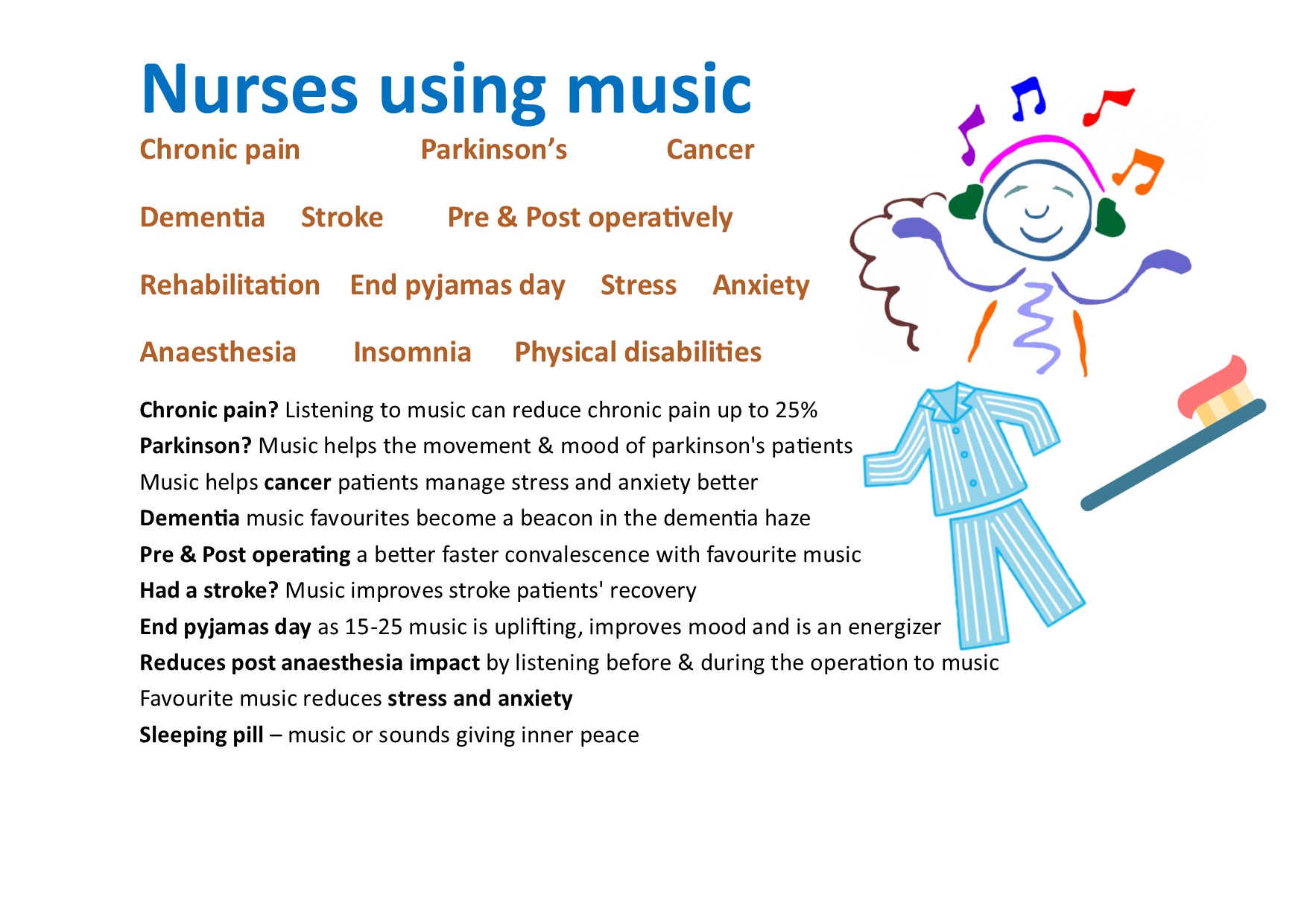You go into hospital and what do you take with you? A toothbrush, pyjamas and…..a playlist!
These are the basic necessities everyone needs in a hospital.
A playlist? Yes a playlist filled with happy and favorite songs.
Why music? Because music is a powerful care aid, it has no side effects, cost no money and with music patients recovering better and faster.
Did you know when Florence Nightingale wrote her seminal guide to nursing, she cited the importance of music to the patient.

Now more than 100 years later people are becoming more and more convinced that listening to music makes us feel better and many doctors are now beginning to believe that music does much more.
There is emerging evidence that it can bring about physical changes to the body that can improve our health. As Professor Paul Robertson says “ We are approaching the point where a doctor would legitimately be negligent not to actually recommend music as a therapeutic intervention”
You will be amazed how much you contribute to a patients recovery and wellbeing when you prescribe music for them. 3 times a day listening to your personal favorite music, sing along and going out of bed is allowed.
The results of the impact of music has been researched and proven in
Chronic Pain? Listening to music can reduce chronic pain by up to 25%
Parkinsons? Music helps the movement & mood of patients with Parkinsons
Cancer patients manage stress & anxiety better by listening to music
Had a stroke? Music improves recovery.
Pre & Post operatively - a better faster convalescence with favourite music
End PJ Paralysis - as 15-25 music is uplifting, improves mood and is an energizer
Reduce post anaesthesia impact by asking the patient to listen before and during the operation to his favourite music.
Not sleeping? Music or sounds give inner peace and can work better than a sleeping pill.
Dementia, reduces anxiety and 'problem' behaviour with the right music which also is a care aid during care actions.
Favourite music reduces stress and anxiety, with leads to a better and faster recovery.
So music as a nursing intervention, is not as crazy as it sounds
“Music is an interesting therapeutic method which can easily take place in the panoply of nursing interventions. It may seem extravagant in our hyper technical care institutions where there is only place for interventions of a medical nature. But music, like other activities such as writing and the exercise of creativity can bring important advantages to our patients” writes Margot Phaneuf in her research paper .
That’s why every patient should bring his toothbrush, pyjamas and playlist to the hospital. If the patient is unable to arrange this, ask the family or his friends if they can take care of a playlist filled with the persons favorite music.
Super power has the music from the 15-25 age period. This is the music we have heard between our 15 and 25 years. This music is deeply rooted in our brain. Hearing songs from the 15-25 age window brings back the joy and the happiness of those teenage years.
Try it for yourself: listen to a song from when you were between 15 and 25 and see what happens.
Creating a 15-25 list is a fun thing to do . It’s a distraction from pain and sorrow, it makes you feel good and the rediscovered music contributes to your recovery.
Music helps those with mental or physical disabilities and is also a powerful tool for convalescence, which is very important after a stroke, seizure or other serious conditions.
We all respond to music emotionally, physically, mentally. It moves us figuratively and literally, so it a great aid to get people out of bed and get them moving.
End pyjamas days! Music in support of mental health could support treatment, take away anxiety and might support people with mental disabilities the same way.
So let’s bring in the power of music into the hospital.
Nurses go Music!
Advise, ask and prescribe music to your patients.
Ask the patient to bring his toothbrush, pyjama and a playlist filled with his favorite music. If the family have to take care for the playlist you can refer them to MusicShelter.info especially when the patient has dementia. Here they can find the tools to help them find the right music and how they can make playlists which help their relative and makes your work much easier.
Start with the patients music and work backwards, you might think music is a small thing but you know now it can be turn in a huge thing. Remember The Blonde is saying it over and over “The little Things are The Big Things”
Success and much Joy with bringing the power of music into healthcare where music is not a luxury but a necessity. I
Ignar Rip your Fab ambassador from Holland
Researched & Proven
New study confirms listening to music during surgery reduces pain and anxiety

Scientists have proved that listening to music before, during and after surgery reduces people's pain, anxiety and need for painkillers - according to the most comprehensive review of available evidence so far.
Listening To Music Can Reduce Chronic Pain And Depression By Up To A Quarter
Listening to music can reduce chronic pain and depression by up to 25 per cent and make people feel more in control and less disabled by their condition.
The Effects of Music Therapy on Anxiety and Depression of Cancer Patients
The findings of this study show the effect of music therapy on the anxiety and depression of patients with cancer.
Music can reduce pain and anxiety following surgery

Overall, patients receiving a music intervention experienced less pain and anxiety up to seven days following surgery compared with usual care or placebo-type interventions. Music was effective for decreasing anxiety when used before, during or after surgery. There was a larger difference in post-operative anxiety between intervention and control groups when music was played before surgery
Into the groove: Can rhythm influence Parkinson's disease?
Previous research has noted that music can improve gait in several pathological conditions, including Parkinson's disease, Huntington's disease and stroke
Music interventions for preoperative anxiety.
Patients awaiting surgical procedures often experience significant anxiety. Such anxiety may result in negative physiological manifestations, slower wound healing, increased risk of infection, and may complicate the induction of anaesthesia and impede postoperative recovery. To reduce patient anxiety, sedatives and anti-anxiety drugs are regularly administered before surgery. However, these often have negative side effects and may prolong patient recovery. This systematic review indicates that music listening may have a beneficial effect on preoperative anxiety. These findings are consistent with the findings of three other Cochrane systematic reviews on the use of music interventions for anxiety reduction in medical patients. Therefore, we conclude that music interventions may provide a viable alternative to sedatives and anti-anxiety drugs for reducing preoperative anxiety.
Enhancement of stroke recovery by music
The connection of musical sounds and the brain functions is a major challenge of modern neuroscience. It has long been proven that music has a psychological effect on human beings, including induction and modification of cognitive states, moods and emotion. Brain activity, metabolism and blood flow are closely linked. Cognitive activation leads to metabolic changes in specific cortical centres. Consequently, any change in cognitive cortical activity reflects in blood flow velocity. This is especially important in patients recovering from stroke.
A preferred music listening intervention to reduce anxiety in older adults with dementia
Preferred music listening had a positive impact by reducing the level of anxiety in older adults with dementia
The Effects of Music on Pain: A Meta-Analysis
Considering all the possible benefits, music interventions may provide an effective complementary approach for the relief of acute, procedural, and cancer/chronic pain in the medical setting.
Music listening after stroke: beneficial effects and potential neural mechanisms
Music is an enjoyable leisure activity that also engages many emotional, cognitive, and motor processes in the brain. Here, we will first review previous literature on the emotional and cognitive effects of music listening in healthy persons and various clinical groups.
Music listening in daily life improved perceived control over pain in female FMS patients.
The Use of Music Therapy During the Treatment of Cancer Patients: A Collection of Evidence
The use of music therapy in the integrative treatment of cancer patients is a therapeutic option whose salutogenetic potential is shown in many case studies such as those presented here.
Music seeps through the soul and lifts the spirit, it excites and calms, unites and serves in solitude - Rosemary Musachio
Using people’s favorite music has great potential to make them feel at home in difficult situations
Music has power of revitalizing our inner soul. it creates positive vibes which help in recovery.

